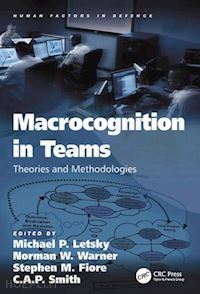Contents: Preface; Macrocognition in teams, Michael Letsky and Norman W. Warner; Empirical model of team collaboration: focus on macrocognition; Norman W. Warner and Michael P. Letsky; Shared mental models and their convergence, Sara A. McComb; Communication as team-level cognitive processing, Nancy J. Cooke, Jamie C. Gorman and Preston A. Kiekel; Collaboration, training and pattern recognition, Steven Haynes and C.A.P. Smith; Towards a conceptual model of common ground in teamwork, John M. Carroll, Gregorio Convertino, Mary Beth Rosson, Craig H. Ganoe; Agents as collaborating team members, Abhijit V. Deshmukh, Sara A. McComb and Christian Wernz; Transferring meaning and developing cognitive similarity in decision making teams: collaboration and meaning analysis process, Joan R. Rentsch, Lisa A. Delise and Scott Hutchison; Processes in complex team problem-solving: parsing and defining the theoretical problem space, Stephen M. Fiore, Michael Rosen, Eduardo Salas, Shawn Burke and Florian Jentsch; Augmenting video to share situation awareness more effectively in a distributed team, David Kirsh; EWall: a computational system for investigating and supporting cognitive and collaborative sense-making processes, Paul Keel, William Porter, Mathew Sither and Patrick Winston; DCODE: a tool for knowledge transfer, conflict resolution and consensus building in teams, Robert A Fleming; Modeling cultural and organizational factors of multinational teams, Holly A.H. Handley and Nancy J Heacox; CENTER: critical thinking in team decision making, Kathleen P. Hess, Jared Freeman and Michael D. Coovert; Measuring situation awareness through automated communication analysis, Peter W. Foltz, Cheryl A. Bolstad, Haydee M. Cuevas, Marita Franzke, Mark Rosenstein and Anthony M. Costello; Converging approaches to automated communications-based assessment of team situation awareness, Shawn A. Weil, Pacey Foster, Jared Freeman, Kathleen Carley, Jana Diesner, Terrill Franz, Nancy J. Cooke, Steve Shope and Jamie C. Gorman; Shared lightweight annotation technology (SLATE) for special operations forces, Mark St. John and Harvey S. Smallman; JIGSAW - joint intelligence graphical situation awareness web for collaborative intelligence analysis, Harvey S. Smallman; The collaboration advizor tool: a tool to diagnose and fix team cognitive problems, David Noble; Collaborative operational and research environment (CORE): a collaborative testbed and tool suite for asynchronous collaboration, Elizabeth M. Wroblewski and Norman W. Warner; Plug-and-play testbed for collaboration in the global information grid, Alex Bordetsky and Susan Hutchins; Naturalistic decision making based collaboration scenarios, Elizabeth Wroblewski and Norman W. Warner; Macrocognition research: challenges and opportunities on the road ahead, Stephen M. Fiore, C.A.P. Smith and Michael P. Letsky; Index.











